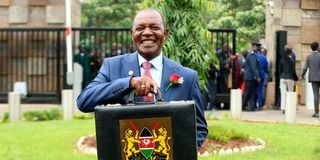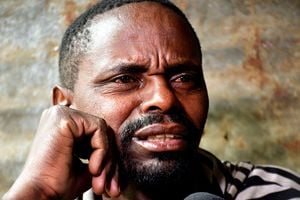Education sector receives Sh628.6 billion, highest share of 2023/24 budget

National Treasury Cabinet Secretary Njuguna Ndung’u arriving at Parliament Buildings for the reading of the 2023/24 Budget Statement on June 15, 2023
The education sector has again received the largest share of the national budget, with a total allocation of Sh628.6 billion for the 2023-24 financial year, representing 27.4 per cent of planned national expenditure.
The allocation proposed by National Treasury Cabinet Secretary Njuguna Ndung'u is an increase from the Sh544.4 billion allocated to the sector last year.
The Teachers Service Commission (TSC) takes the lion's share of the budget (Sh316.7 billion). The commission was allocated Sh1 billion for teacher promotions, although it had requested Sh2.2 billion. Teachers have complained that many of them have been stagnating in the same jobs, stalling their career progression.
It will also receive Sh4.8 billion for the recruitment of permanent and pensionable teachers and Sh4.8 billion for the recruitment of 20,000 contract teachers. A further Sh1.3 billion has been proposed for training teachers on the competency-based curriculum.
The Kenya National Examinations Council (Knec) will receive Sh5 billion for examinations for primary and secondary school students. The examination agency has struggled to meet some of its obligations as the allocation for the examination waiver has remained the same despite an annual increase in the number of candidates.
Also Read: The updates on the first Kenya Kwanza budget
"This has put a strain on Knec in terms of effective execution of its mandate, including payment of facilitators (invigilators, security personnel, examiners, markers) as well as logistics," the budget committee report said.
The Free Primary Education programme has been allocated Sh12.5 billion, while the Free Day Secondary Education programme has been allocated Sh65.4 billion. This includes expenditure on the EduAfya health insurance scheme administered by the National Hospital Insurance Fund.
Junior Secondary School (JSS) learners have a capitation of Sh25.5 billion. Each JSS learner will receive Sh15,042. Secondary and higher secondary schools will also receive Sh6 billion for infrastructure. This is an increase from the Sh2.8 billion allocated last year. This is the money that MPs have proposed to channel through Constituency Development Fund (CDF).
To kick-start the new higher education funding model, the allocation to the Higher Education Loans Board has been doubled from Sh15 billion to Sh30 billion. Under the model, the automatic block grant for higher education has been replaced by individual support through scholarships, loans, bursaries and household contributions.
Higher education has been allocated Sh97 billion.
The school feeding programme has been allocated Sh5 billion. The programme is currently being implemented by the national and county governments. The Budget Appropriations Committee has proposed that the CDF match the national government's contribution to ensure that the scope of this programme covers all schools, including special needs schools.
Kenya's Kwanza manifesto had promised to double the budget for the feeding programme to increase the number of beneficiaries from two million to four million. The programme is currently being implemented in 26 counties.
Schoolgirls will be supported through the provision of sanitary pads at a cost of Sh940 million, while the Digital Learning Programme and ICT Integration in Secondary Schools has been allocated Sh400 million. The Kenya Secondary Education Quality Improvement Project, which will conclude at the end of the year, will receive Sh2.7 billion.
The Ministry of Technical and Vocational Education and Training has been allocated Sh5.2 billion for student grants, Sh1.9 billion for construction and equipment of TVET institutions and Sh1.8 billion to increase access and improve quality under the East African Skills Transformation and Regional Integration Project.
A further Sh920 million has been earmarked for TVET and entrepreneurship and Sh1.5 billion for promoting youth employment and skills. Prof Ndung'u proposed Sh749 million for research, science and innovation.





